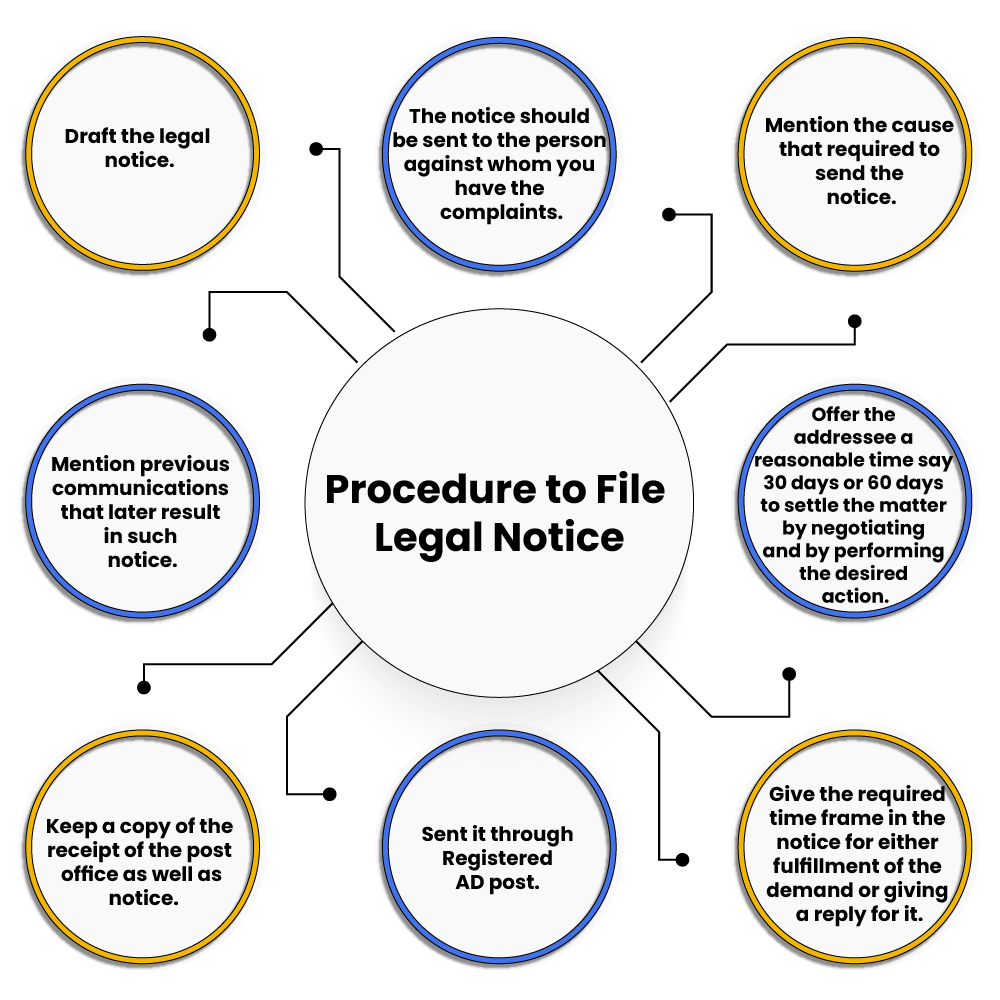What is a Legal Notice?
A Legal Notice is a notice specifying your opponent that you are preparing to prosecute a litigation or suit against him if the required demand is not fulfilled by the opponent.
Who can issue Legal Notice in India?
Legal Notice can be issued by a consumer himself. But legal notice should be issued by professionals.
Advantages of Legal Notice

- Information
A legal notice, when sent, delivers your intention before the beginning of legal proceedings. A legal NOTICE makes the other party aware of the grievance. A legal notice informs the other party of the same and the consequences of their actions which they may face in a court of law.
- Written Warning
A legal notice is a written warning which conveys the opponent your plan of action. A legal notice creates an anxiety in the other party's mind that aggrieved party are going to court of law.
- Out of Court Settlement
A legal notice includes or mentions the complaint of the party which is inclusive of all the necessary facts. It stipulates the relief plus the legal remedy required by the party. It is also made clear in the notice that the grievance can also be sorted in an amicable manner if opponent agrees to and within given time frame.
- Mutual Understanding
A legal notice can be productive in the procurement of the desired result rather than an oral communication. A notice and or a reply drafted for a legal notice can, therefore, bring a mutual understanding between the two parties.
- Cost Friendly
A notice is a powerful tool and not so expensive. The cost of the notice may differ from office to office and the complexity of the issue involved though.
- Removal of Doubt
Any doubt regarding the intentions is resolved once a reply it is received. If no reply is received within the time frame with regards of the notice then it becomes clear that the receiving party has taken notice casually and the legal remedial measures can be availed there onward.
- Record
It is a written record that a valid relief was sought from the receiving party before going to the court of law. The notice can further be annexed with the court documents and can be mentioned to during litigation.
Importance of Filing a Legal Notice
Many alternatives can be considered beginning with a lawsuit. Some of these alternatives are:
- Negotiation (e.g., an exchange of letters between the parties).
- Mediation
- Arbitration
Negotiation can be done between parties outside court too. But
if negotiations do not work, an individual/firm need not directly file a suit in a court of law. Individual or firms shall serve a Legal Notice on them intending to settle the dispute by any of the above way or by the court process.
Contents of Legal Notice

Drafting of legal notice covers all things that a party would demand from the opponent and other necessary clauses too.
A legal notice must include the following:
- Brief report of the facts giving rise to the claim.
- Relief sought by plaintiff against each defendant which is mentioned in the legal notice.
- Short summary as to why the relief sought through legal basis.
Procedure to File Legal Notice

- Draft the legal notice.
- The notice should be sent to the person against whom you have the complaints.
- Mention the cause that required to send the notice.
- Mention previous communications which later result in such a notice.
- Offer the addressee a reasonable time say 30 days or 60 days to settle the matter by negotiating and by performing the desired action.
- Give required time frame in notice for either fulfilment of the demand or giving reply for it.
- Sent it through Registered AD post.
- Keep a copy of the receipt of the post office as well as notice.
Frequently Asked Questions
The employment cases in which a Legal Notice can be sent are, Employee’s Unpaid Salary, Non-Adherence to Company’s Policies, Sexual Harassment at Workplace, Employment Contract, Disclosure of Confidential Information, Leaving a Job without giving Resignation Letter, False Claims of Sexual Harassment.
Anyone can draft a Legal Notice in India. However, it is always advised to contact an experienced lawyer for drafting a Legal Notice.
The Time Limit for Filing a Reply to a Legal Notice ranges from 15 to 30 days.
The Time Limit for Filing a Reply to a Consumer Complaint can exceed up to 45 days.
In case the opposite party does not file a reply with the prescribed time frame, the court can pass an Ex-parte order in favour of the sender or plaintiff.
The term “Show Cause Notice” means a notice sent to any person or individual by any authority. Further, the term “Authority” includes Employer, Government, Passport Authority, etc.
The situations in which a buyer can send a legal notice to the builder are Delay Possession, Abandons Project Site, Refuses to Provide Possession Certificate, or Refuses to adhere to the provisions of RERA.
If in case a tenant refuses the leave the premise even after the expiry of the Rent Deed or Lease Deed, a landlord can send a Legal Notice for Eviction to him/ her.
The situations in which a Consumer can send Legal Notice are, Defective Goods, Deficient Service, Loss caused to the Consumer due to Restrictive Trade Practice, and Goods are Dangerous for Human Life, etc.
The main objective of sending a Legal Notice is to display the intention of one party to initiate legal measures.
The contents of a Legal Notice are Brief details of the facts giving rise to the Claim, Relief sought by the Plaintiff, and the Short Summary as to why the Plaintiff sought Relief through Legal Basis.
The Advantages of a Legal Notice are Gives Information, Acts as a Written Warning, Provides out of Court Settlement, Promotes Mutual Understanding, Cost Friendly, Removal of Doubt, and Acts as a Legal Proof.
Normally, a period of 3 to 4 days is required to Draft a Legal Notice in India.
The term “Legal Notice” denotes a document that informs the opposite party or defendant about the intention of the plaintiff of instituting suit against him/ her.
No, it is not mandatory to send a Legal Notice in every case, and the same depends on the facts of the case.
The steps involved in the process to draft a Legal Notice are Contact a Well Experienced Lawyer, Discuss objectives with him, Drafting of the Legal Notice, Send for Review, Notice Sent to Defendant.
Section 80 of the Code of Civil Procedure deals with the Legal Notice filed in Civil Cases.


